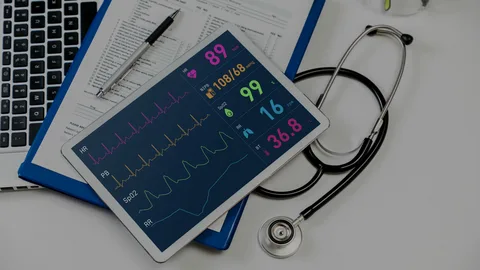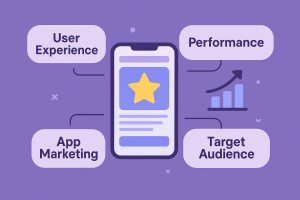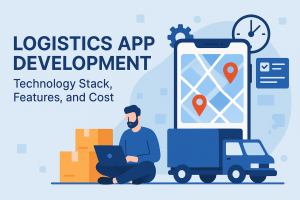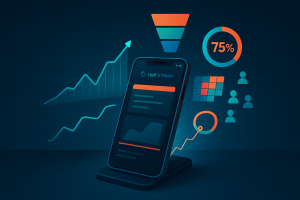Healthcare apps are taking center stage in a society where technology is king. Imagine relaxing on your couch while keeping track of your health, scheduling appointments, or communicating with your doctor on the phone. Doesn’t it sound like an unreal scenario? These applications, however, are changing the game for both patients and medical professionals.
The digital world is booming due to the rise in the creation of iOS app development and Android app development as well as game app development. And now, it’s taking on the healthcare industry head-on, revolutionizing the way that convenience and innovation are combined.
But why all the excitement? Let us analyze how these intelligent technologies are changing healthcare, tackling significant issues, and reshaping the industry.
Key Benefits of Healthcare Apps
Healthcare Apps are similar to carrying a miniature clinic. Here’s why they’re so important.
Convenience on the Go: Everything is just a tap away, including scheduling appointments and retrieving medical records.
24/7 Access to Care: At any time, patients can access self-care resources or communicate with doctors.
Better Patient Engagement: Apps notify patients by reminding them to take their medications, schedule checkups, or do blood tests.
Cost-effective Solutions: Patients and providers both benefit financially from fewer needless visits.
Better Diagnosis and Monitoring: Wearables that track data in real-time link with applications to provide doctors with immediate information.
Types of Healthcare Apps
Apps for healthcare are diverse and can be tailored to meet a variety of needs. Among the most popular are
- Telemedicine applications that allow patients to consult with doctors virtually.
- Step counters, meditation tools, and diet regimens are examples of fitness and wellness apps.
- Medication reminder apps. Remember to always take your medications on time.
- Apps that help people manage long-term conditions like diabetes or heart disease.
- Apps for hospital management help hospitals with patient flow, scheduling, and documentation.
Core Features of Healthcare Apps
Some qualities are essential for success in the cutthroat healthcare retail app development industry. Personalized dashboards and user profiles provide experiences that are customized for both doctors and patients. Sensitive health records must be stored securely to prevent breaches. While wearable integration provides smooth syncing with gadgets like smartwatches and fitness trackers, appointment scheduling streamlines the booking procedure for all parties. Last but not least, telemedicine features like live chats, video conferencing, and instant messaging help treatment and make healthcare more accessible than before.
Critical Factors for Successful Healthcare App Development
Not every app is successful. For a successful healthcare app development, research about
User-Centric Design: Apps have to be straightforward, streamlined, and intuitive to use.
Regulation Compliance: To protect user data, abide by HIPAA, GDPR, and other regulations.
Cross-Platform Functionality: Applications have to function just as effectively on the iOS and Android operating systems.
Updates that go smoothly: Frequent updates keep the program current and free of bugs.
The Role of AI and Machine Learning in Healthcare Apps
Healthcare apps are being revolutionized by machine learning (ML) and artificial intelligence (AI). Tools driven by AI can
- Analyze user data to make early illness predictions.
- Customize care in line with health trends.
- Improve chatbots to provide immediate medical guidance.
Fun fact: AI is currently included in around 30% of healthcare apps, and the percentage is growing!
Integration with Healthcare Systems and IoT
The Internet of Things (IoT) improves the intelligence of healthcare apps. Consider wearable technology, smart thermometers, or glucose monitors. The Internet of Things connects these devices to applications for better results and real-time monitoring.
Smooth communication between patients, applications, and healthcare practitioners is made possible via integration with electronic health records (EHRs).
Challenges in Healthcare App Development
But hold on, things aren’t always easy. The following are some difficulties faced by developers
Data Privacy Issues: It could prove challenging to protect sensitive data.
Regulatory Challenges: Complying with compliance regulations can be quite difficult.
User Adoption: Convincing senior citizens to utilize applications is a difficult task.
Problems with interoperability: Making sure applications function properly with current platforms.
Best Practices for Designing Healthcare Apps
Follow these golden guidelines while creating remarkable health apps
- Keep It Easy to avoid giving users too many features.
- Put Security First to protect data, use encryption.
- Extensive testing guarantees a faultless user experience.
- Involve Users to gather feedback so that the program can be improved over time.
Step-by-Step Guide to Developing a Healthcare App
Research and Planning: To begin, identify who your target audience is and what their problems are. Analyze rivals and determine what features your app will provide to meet these difficulties.
Wireframing and Design: Lay out the app’s structure and functionality using a simple layout. Make an effort to create a simple, user-friendly design that appeals to all ages.
Development: Depending on your platform (iOS, Android, or both), select the appropriate technology stack. Incorporate essential elements such as wearable integration, telemedicine capabilities, and secure data storage.
Testing: To get rid of glitches, secure lag-free operation, and confirm device compatibility, do extensive testing. Put data privacy and security first in order to satisfy healthcare regulations.
Launch: Put your app on app stores and make sure it has a solid marketing plan. Use app store optimization (ASO), targeted promotions, and user feedback for a successful launch and future upgrades.
Future Trends in Healthcare App Development
Healthcare applications have a bright future ahead of them since the sector is being shaped by creative ideas. Apps that are customized to each patient’s health profile for more precise treatment are at the forefront of personalized medicine. Virtual surgery training and interactive patient education are made possible by Augmented Reality (AR), which is transforming the sector. Sensitive health data is being unhackably protected by blockchain technology, which is raising the bar for security. Pharmacies are using digital prescriptions and providing smooth services through applications, which is changing even retail integration. All of these developments are changing how healthcare is provided and received.
The Transformative Impact of Healthcare Apps
The creation of healthcare apps aims to save lives, increase access to treatment, and advance the intelligence of the healthcare sector. It is not simply about technology. The possibilities are unlimited when AI, iOS app development, and Android app development are combined. Is it time to embrace this revolution? The healthcare of the future is here, and it’s economical.







